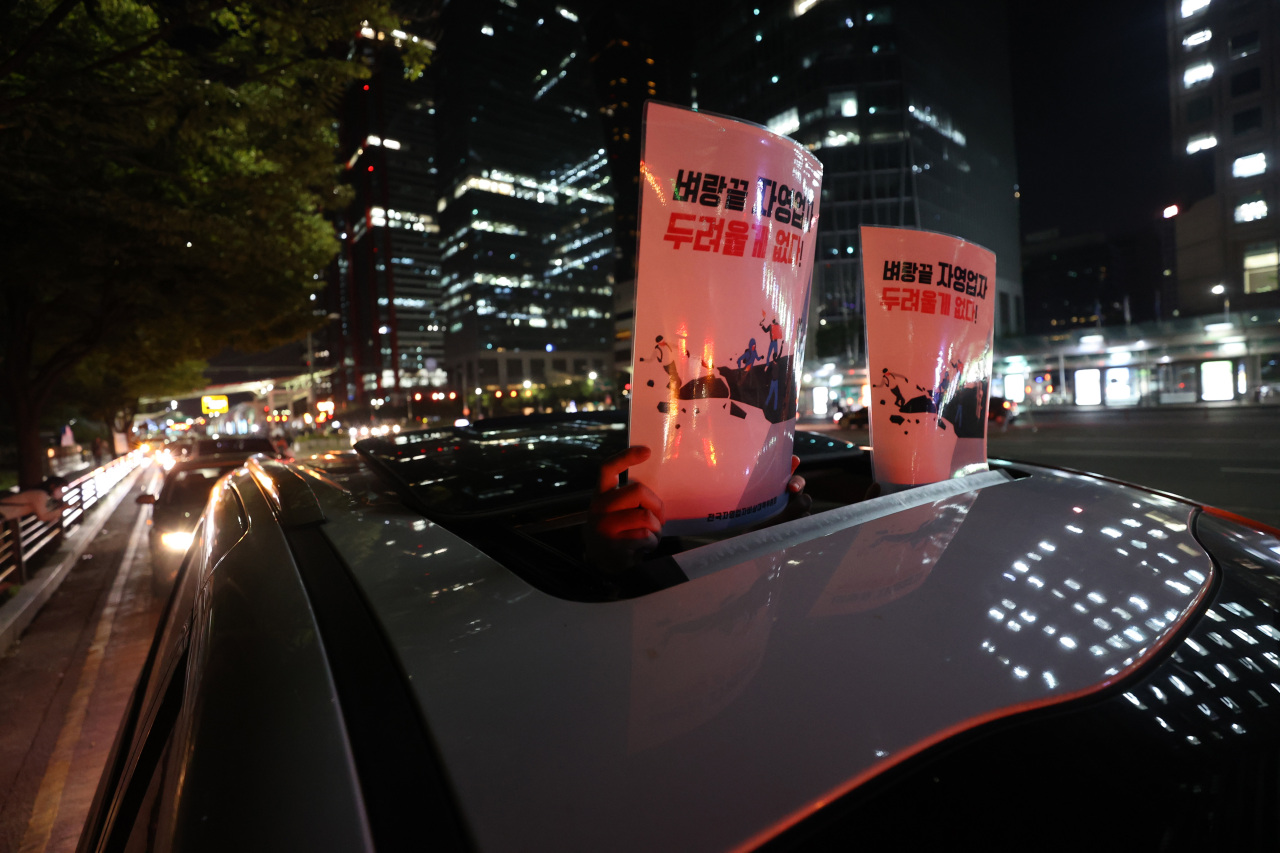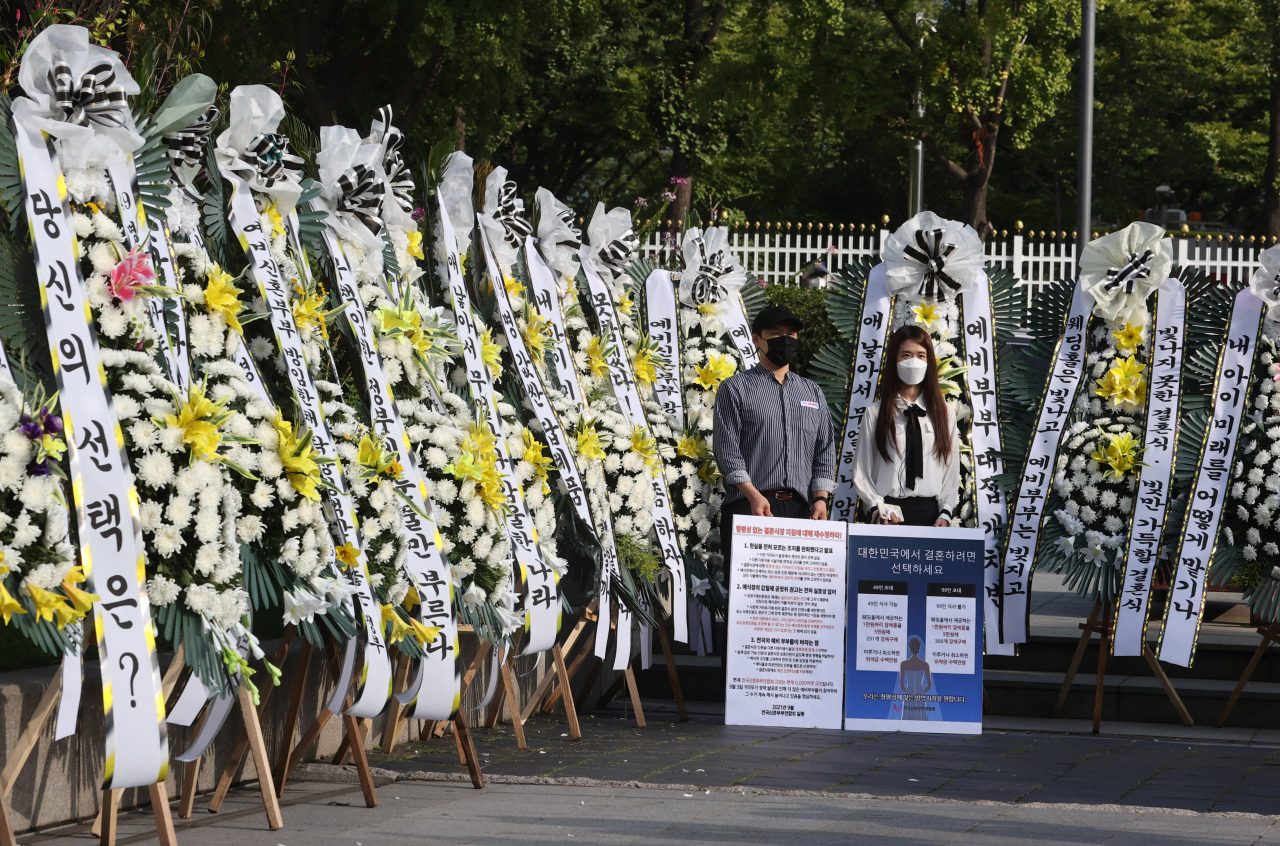 |
Signs reading “small business owners are at the edge, (we) have nothing to fear” are being held up through a car sunroof during a late night protest in Seoul. (Yonhap) |
Thousands of small-business owners took to the streets late Wednesday in the first nationwide protest against COVID-19 rules they claim are jeopardizing their livelihoods.
They say they’ve had enough of restrictions on private gatherings and operating hours, and that the measures are drowning small businesses in debt.
From 11 p.m. Wednesday to 1:15 a.m. Thursday, small-business owners in nine regions across South Korea staged a drive-past rally under the lead of a committee of small-business owners associations made to represent their demands to the government.
While the committee organized regional in-car rallies in the past, it is the first time that it launched one on a national scale. Wednesday night rallies were held in Seoul, Busan, Ulsan and major cities within North Jeolla, South Jeolla, South Gyeongsang, North Chungcheong, South Chungcheong and Gangwon provinces.
It was estimated that around 1,000 vehicles took part in the rally for Seoul. The rally consisted of vehicles lined up in single file moving at around 20 kilometers per hour.
“What small-business owners want is not a time limit but an environment where they can do business,” Lee Chang-ho, head of the committee, told reporters during the rally.
“I hope businesses are allowed to open 24 hours and that virus policies are changed to be more based on autonomy and responsibility.”
The committee says proprietors have incurred more than 66 trillion won ($56.5 billion) in debt over the past 18 months, with close to 453,000 businesses shutting their doors on the way.
Compensation for their losses has also remained weak, small-business owners say, as South Korea only provided 4.5 percent of its gross domestic product as opposed to the OECD average of 16.3 percent. They ask their demands to be upheld when drafting COVID-19-related policies.
While the government introduced a number of budget-backed measures to help small businesses recoup their losses, these measures were found to be only partially effective, as strict qualifications have made many ineligible for the funds.
And small-business owners say that the government is yet to provide any improvements to their business environment, even though the fatality rate among COVID-19 patients in South Korea fell from 3 percent months back to near 0.1 percent in recent days.
At the moment, Seoul, Incheon and Gyeonggi Province allow up to six people to gather if it includes at least two vaccinated people during the daytime and four after 6 p.m. Most businesses have to close by 10 p.m. and only takeout or delivery is allowed from 10 p.m. to 5 a.m.
The lack of changes in virus rules has forced small-business owners to constantly debate whether to make extreme choices to avoid their continuing difficulties, small-business owners say. Many of them have considered suicide, as they feel abandoned with no sign of a way out for the past 18 months, they add.
Former Jeju Province Gov. Won Hee-ryong, one of the presidential contenders within the main opposition People Power Party, joined the rally in Seoul to denounce the government for taking advantage of small-business owners in carrying out their political initiatives.
“The government is essentially sticking with politically swayed virus policies, only caring about the number of new daily cases and misusing the spirit of cooperation from small-business owners,” Won said at the scene.
The police in Seoul warned it would take stern action as it said the rally had violated virus rules in place. Officers deployed to the scene took photographs of participating vehicles for possible punishment in the future.
They said drive-thru rallies are illegal if two or more participants attended, as Level 4 social distancing rules prohibit the assembly of more than one person. Rally participants claimed they have strictly complied with social distancing rules for the rally, staying in their cars and leaving windows closed.
In response to the rally, the presidential office said Thursday that it is concerned of the difficulties that small-business owners face, adding its officials are working to find a compromise between virus rules and the economy to lift the burden of small-business owners.
 |
Members of an association of newlyweds protest the social distancing measures applied to weddings outside the government complex in Seoul on Thursday. (Yonhap) |
Other communities too are also dissatisfied with the government’s virus measures.
A coalition representing newly married couples on Thursday staged a protest in front of the Seoul Government Complex demanding rules on weddings be eased.
The group representing 600 men and women who were either newly married or about to be married is demanding for increased number of visitors for weddings, as well as vaccine incentives for visitors to attend. The coalition also demands the cap on guests to be flexible based on the size of wedding halls.
The couples say the venues they pay for usually demand a headcount of at least 250 people, a figure impossible to meet when current virus rules only allow up to 49 guests when food is provided and 99 for noncatered weddings.
“We hope officials do not believe that the criticism against them will shrink after the wedding because it is a one-time event,” the coalition said in a statement. “They need to stop avoiding the voice of the young generation and prepare realistic measures.”
By Ko Jun-tae (
ko.juntae@heraldcorp.com)









![[Today’s K-pop] Blackpink’s Jennie, Lisa invited to Coachella as solo acts](http://res.heraldm.com/phpwas/restmb_idxmake.php?idx=644&simg=/content/image/2024/11/21/20241121050099_0.jpg)